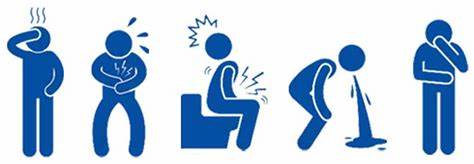Stomach flu, scientifically known as viral gastroenteritis, is a common viral infection affecting the stomach and intestines. It leads to symptoms such as nausea, vomiting, diarrhea, and abdominal pain. Understanding the causes, symptoms, treatment, and prevention methods can help manage and prevent the spread of this contagious illness.
What is Stomach Flu?
Stomach flu, or viral gastroenteritis, is a viral infection primarily affecting the stomach and intestines. It is commonly caused by several different viruses, including norovirus, rotavirus, adenovirus, and astrovirus. These viruses are highly contagious and can spread easily from person to person through contaminated food, water, or surfaces, making stomach flu outbreaks common in places like schools, daycare centers, and nursing homes.
Symptoms of Stomach Flu
The symptoms of stomach flu typically manifest within one to three days after exposure to the virus. Common symptoms include:
- Nausea: A feeling of queasiness or an urge to vomit.
- Vomiting: The forceful expulsion of stomach contents through the mouth.
- Diarrhea: Frequent, loose, or watery bowel movements.
- Abdominal pain: Cramping or discomfort in the stomach area.
- Fever: Elevated body temperature, often accompanied by chills.
In severe cases, dehydration may occur, especially in young children, older adults, and individuals with weakened immune systems.
Treatment for Stomach Flu
While there is no specific medication to cure stomach flu, treatment focuses on relieving symptoms and preventing dehydration. Here are some recommended treatment options:
- Hydration: Drink plenty of fluids, such as water, clear broths, or electrolyte solutions, to replace lost fluids and prevent dehydration.
- Rest: Get plenty of rest to help your body recover from the infection.
- Dietary adjustments: Stick to bland, easily digestible foods like rice, bananas, toast, and applesauce until symptoms improve.
- Over-the-counter medications: Anti-nausea medications or antidiarrheal drugs may help alleviate symptoms, but consult with a healthcare professional before using them, especially in children.
In severe cases or if dehydration occurs, medical attention may be necessary. Intravenous fluids and electrolyte replacement may be administered to restore hydration and electrolyte balance.
Preventing Stomach Flu
Prevention is key to avoiding stomach flu and reducing its spread. Here are some preventive measures to consider:
- Practice good hygiene: Wash your hands frequently with soap and water, especially before eating, after using the bathroom, and after handling contaminated items or surfaces.
- Clean and disinfect: Regularly clean and disinfect frequently touched surfaces and objects, such as doorknobs, countertops, and toys.
- Avoid close contact: Avoid close contact with individuals who have stomach flu symptoms, and refrain from sharing utensils, cups, or food with them.
- Stay home when sick: If you are experiencing symptoms of stomach flu, stay home from work, school, or social gatherings to prevent spreading the virus to others
Disclaimer : इस न्यूज़ पोर्टल को बेहतर बनाने में सहायता करें और किसी खबर या अंश मे कोई गलती हो या सूचना / तथ्य में कोई कमी हो अथवा कोई कॉपीराइट आपत्ति हो तो वह jansandeshonline@gmail.com पर सूचित करें। साथ ही साथ पूरी जानकारी तथ्य के साथ दें। जिससे आलेख को सही किया जा सके या हटाया जा सके ।














